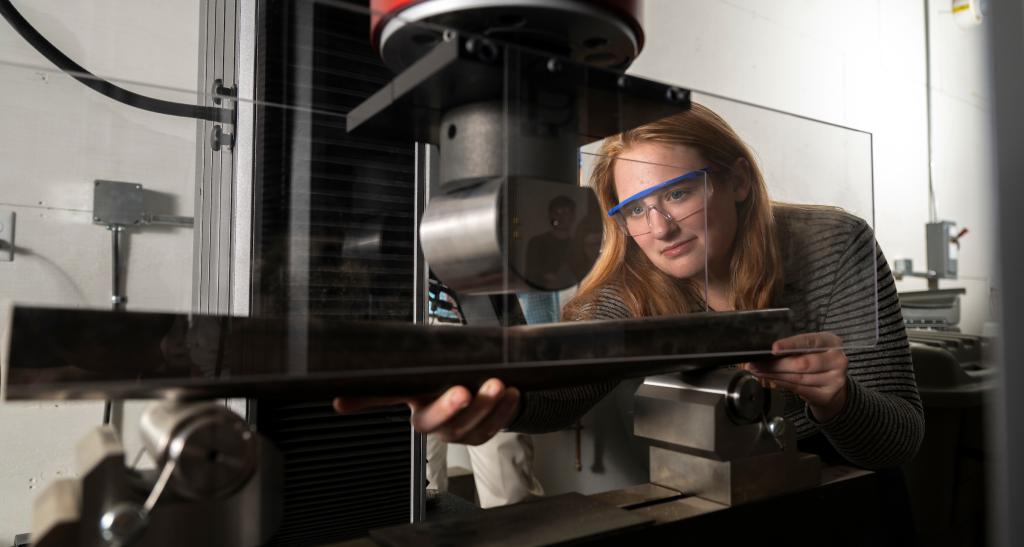York College has one of the few engineering programs nationwide that requires participation in multiple full-time engineering cooperative work experiences (co-ops) in a professional setting.
York College's engineering programs are ABET-accredited. Bachelor of Science degrees are offered in Civil, Computer, Electrical, and Mechanical Engineering.
Benefits for Co-Op Employers
Access to a Highly Motivated Talent Pool of Engineers-in-Training
Lower Training and Recruitment Costs (and Higher Retention for Entry-Level Employees)
Collaboration with Co-Op Directors for Job Postings and Student Connections
Establish YCP Students as Goodwill Ambassadors for Your Company
Free Up Permanent Employees' Time for Long-Term Projects
Engineering Co-Op Employer Resources
The Engineering Co-Op Program is happy to assist employers as they build a recruiting strategy that increases visibility among York College students:
- Promote your company by posting co-op, part-time and full-time positions on Handshake, York College's internal career search engine.
- Attend our annual Career Expo, host a recruiting day, or conduct on-campus interviews.
- Host a company tour or schedule a campus visit to speak with students.
- Collaborate on research projects with students and faculty.
- Provide support for scholarships/activities.
York College's Engineering Co-Op Program Director will email reminders about hiring periods, help you post your co-op positions on Handshake, and assist with scheduling interviews and other networking/recruiting opportunities.
Employers are encouraged to post positions at least three months in advance of the hiring date.
A review of credentials, interviews, and offers should be completed at least one month prior to a student's official start date.
| Academic Year | Fall Semester | Spring Semester | Summer Term |
|---|---|---|---|
| 1st Year | Academic Term | Academic Term | * |
| 2nd Year | Academic Term | Academic Term | CO-OP I |
| 3rd Year | Academic Term | CO-OP II | * |
| 4th Year | Academic Term | Academic Term | May Graduation |
*Students have the option to complete experiential learning opportunities.
Length of Co-Op Experiences
Each co-op experience must last a minimum of 12 weeks (summer) and a minimum of 15 weeks (spring or fall). Work weeks must be full-time. (Extra work is permissible if holidays precede or follow the normal work schedule.)
Some students remain on part-time during the academic rotation and often return to full-time for their next co-op work assignment.
Students co-op each semester as follows:
- Summer: May - August (sophomore year)
- Spring: January - May (junior year)
- A limited number of students may be available for fall co-op semesters (August - December) due to unique student circumstances.
Note: Repetitive co-op sessions at the same company are encouraged, although some students may elect to broaden their experience by working for multiple companies. The student's return is to be agreed upon by both the employer and the student.
The goal is to provide each student with significantly challenging engineering work that truly complements the rigor of his/her academic program. Every effort must be made to ensure that work assignments are:
- Related to the student's academic and career goals
- Properly organized with the goals defined during the first week of the student's co-op
- Planned so that progressively more responsible positions are assigned for each co-op
Students should always be assigned to work with a practicing engineer, but the exact duties and functions they will have in the workplace may vary according to the employer and the abilities and skills of the student. Some examples of potential job functions are:
- Testing of both standard and developmental products or building materials, concrete, soils, water, etc.
- Analyzing test data using statistical methods
- Conducting engineering analysis using thermodynamic, static, dynamic, and vibration analysis, etc.
- Performing engineering design utilizing CAD
- Conducting experiments to assist in the design of products or processes
- Writing operating or processing instructions
- Purchasing, installing and starting up equipment
- Assisting on job sites with project management tasks
An online evaluation of the student is required at the end of the co-op. A faculty advisor will visit the job site about halfway through the semester to discuss the co-op progress with the employer and the student.
For local companies hiring summer interns from outside the area, housing is often a barrier. York College offers safe housing for your summer interns at a reasonable cost to your company. To learn more, please complete the online housing form and/ or reach out to:
Kelly Arcieri
Director, Co-op and Internship Program
Kinsley School of Engineering, Sciences, and Technology
karcieri@ycp.edu
717.815.1733
Carly Elias
Campus Events & Conference Manager
celias@ycp.edu
717.815.1257
Contact Us
Engineering Co-Op Program
Kelly Arcieri
Engineering Co-Op Program Director
Kinsley School of Engineering, Sciences and Technology
Phone: 717.815.1733
karcieri@ycp.edu


